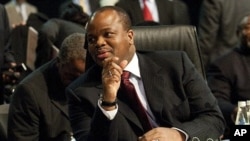Swaziland’s government is negotiating with public sector workers over wage increase demands in an effort to improve their living conditions, according to a government spokesman.
Spokesman Percy Simelane also denied the government spent over $3 million for the celebration of King Mswati III’s 45th birthday last Friday. “The king’s birthday was privately sponsored this year, as [was] the case was last year,” Simelane said.
His comments came after public sector workers demanded improved living conditions, saying extravagant nationwide celebrations for the king’s birthday were an indication that the economy had improved.
Three years ago, the government announced there would be no salary increases for public sector workers for the next three years.
The administration says the country has yet to recover from the global economic downturn, which officials say makes it difficult to meet workers’ demands.
Simelane denied accusations that the government is not interested in the well-being of public sector workers because it refuses to increase salaries.
He said the government had refused to consider a suggestion from the International Monetary Fund, which encouraged it to reduce costs by laying off about 7,000 of the 37,000 public sector workers.
“We did not think it was feasible to send 7,000 civil servants home, because there are policies in this country that if children who are supposed to go to school have either parents who are not working, or parents who have died, [the] government has to pay for their education until they finish,” said Simelane.
“We thought it was not wise and that the best thing was to stop the salary increment for at least three years and see what happens after that,” Simelane said. “It wasn’t like the government didn’t want to increase salaries. It was strategic. We want them to be working and we want their dependents not to suffer.”
Nduduzi Gina, first deputy secretary-general of the Trade Union Congress of Swaziland (TUCOSWA) called on the government to agree to workers’ demands for better conditions.
“We are hopeful we would be awarded the percentage that we would table in the joint negotiation forum with the government, because we have seen then that, yes, it would appear the economy of the country has improved,” said Gina.
Simelane says the economy is showing signs of improvement.
But, critics say the country’s economic polices failed to jumpstart the economy as officials had promised following the global economic downturn. Simelane disagreed.
“It’s a question of knowing mathematics,” said Simelane. “Three years ago the government was not able to pay civil servants in time because of the financial challenges we were facing. We decided to cut down on many other things that required money so that we would be able to buy ourselves out of the situation. It helped because for now there hasn’t been a situation whereby we delayed salaries of civil servants.”
Spokesman Percy Simelane also denied the government spent over $3 million for the celebration of King Mswati III’s 45th birthday last Friday. “The king’s birthday was privately sponsored this year, as [was] the case was last year,” Simelane said.
His comments came after public sector workers demanded improved living conditions, saying extravagant nationwide celebrations for the king’s birthday were an indication that the economy had improved.
Three years ago, the government announced there would be no salary increases for public sector workers for the next three years.
The administration says the country has yet to recover from the global economic downturn, which officials say makes it difficult to meet workers’ demands.
Simelane denied accusations that the government is not interested in the well-being of public sector workers because it refuses to increase salaries.
He said the government had refused to consider a suggestion from the International Monetary Fund, which encouraged it to reduce costs by laying off about 7,000 of the 37,000 public sector workers.
“We did not think it was feasible to send 7,000 civil servants home, because there are policies in this country that if children who are supposed to go to school have either parents who are not working, or parents who have died, [the] government has to pay for their education until they finish,” said Simelane.
“We thought it was not wise and that the best thing was to stop the salary increment for at least three years and see what happens after that,” Simelane said. “It wasn’t like the government didn’t want to increase salaries. It was strategic. We want them to be working and we want their dependents not to suffer.”
Nduduzi Gina, first deputy secretary-general of the Trade Union Congress of Swaziland (TUCOSWA) called on the government to agree to workers’ demands for better conditions.
“We are hopeful we would be awarded the percentage that we would table in the joint negotiation forum with the government, because we have seen then that, yes, it would appear the economy of the country has improved,” said Gina.
Simelane says the economy is showing signs of improvement.
But, critics say the country’s economic polices failed to jumpstart the economy as officials had promised following the global economic downturn. Simelane disagreed.
“It’s a question of knowing mathematics,” said Simelane. “Three years ago the government was not able to pay civil servants in time because of the financial challenges we were facing. We decided to cut down on many other things that required money so that we would be able to buy ourselves out of the situation. It helped because for now there hasn’t been a situation whereby we delayed salaries of civil servants.”










